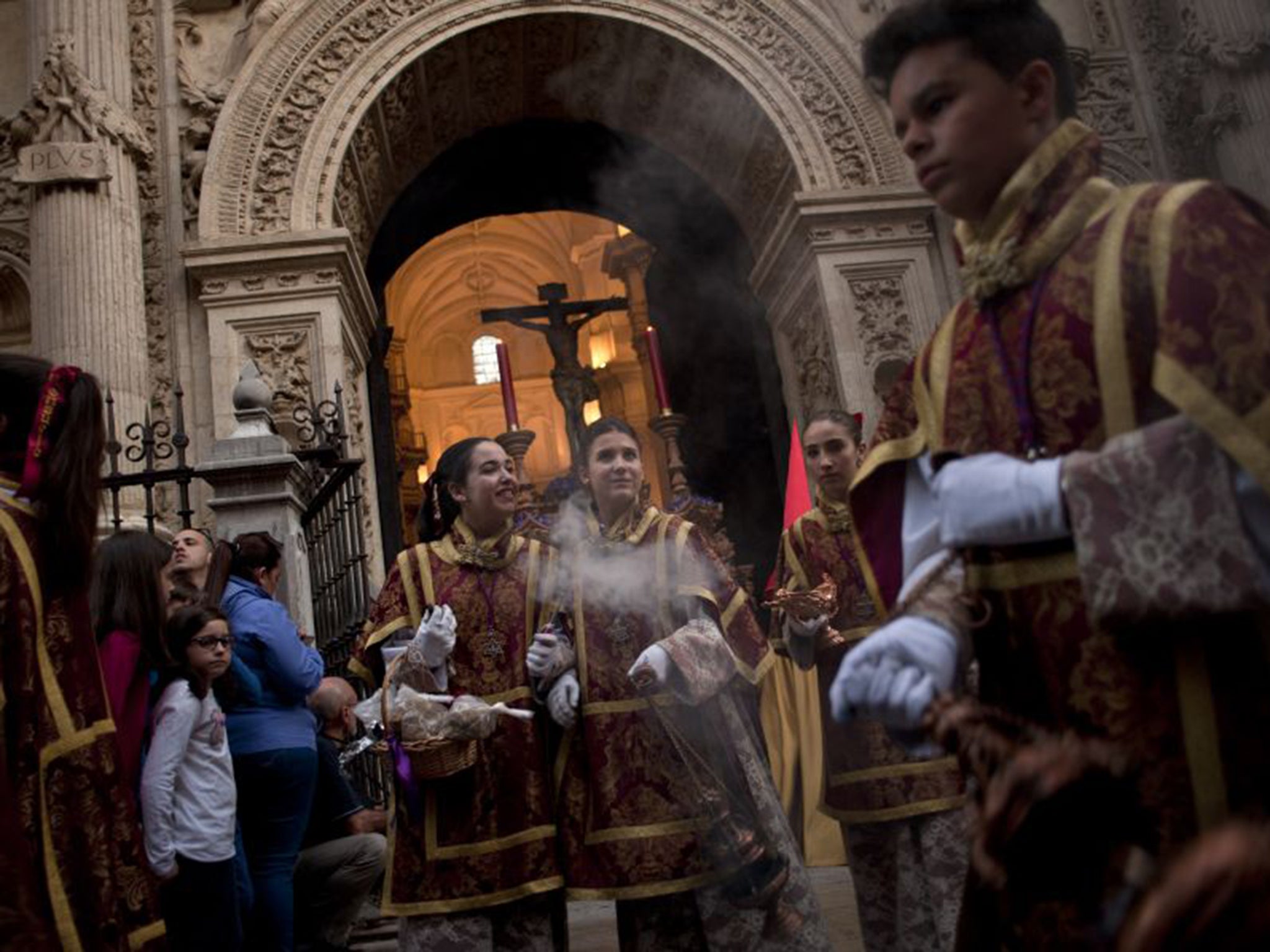Spanish church pardons prisoners in echoes of the first Easter
A ceremony carried out behind closed doors in Spain since 1759 is now a TV event

Under the unblinking stares of huge statues of Christ and the Virgin Mary, and with the church’s ceiling-high Baroque altarpiece, said to be one of Spain’s finest, as a backdrop, the black ribbon on the parchment, representing guilt, is solemnly and symbolically replaced with a white ribbon of pardon.
From the front pew a hooded and cloaked figure watches, almost as motionless as the sculptures all around; he is named only as CME, and the parchment represents a vital step in his future. Members of the local authorities, both religious and secular, then add their signatures.
In a 16th-century monastery church in Granada, CME became the latest of 11 prisoners to be freed this year in Spain’s series of Easter pardons – a practice begun in 1759, when convicts in Malaga rioted because an outbreak of the plague meant Holy Week processions faced cancellation.
Fast forward more than 250 years and the tradition, with echoes of the liberation of Barabbas at the expense of Christ, remains in place, benefiting around 15 prisoners a year across Spain. All cases are subject to the same conditions as any other official pardon; these are described in the state bulletin publishing this year’s list of reprieved prisoners as “reasons of justice, equity or benefit for the general public”.
Yet rather than walking free immediately after the signing of his reprieve, in keeping with tradition, the Granada prisoner remained an important element in Friday’s six-hour religious procession through the city streets that followed. Late into the evening, he walked alone, hooded and bearing a candle, immediately behind the processional throne of the Christ figure; the pardon was carried on a cushion a few metres further back.
“In the case of the first pardon we oversaw, in 1928, a death penalty for murder was changed to perpetual imprisonment, but that nowadays would be inconceivable,” Enrique Crespo Muñoz, head of the Granada brotherhood responsible, Nuestra Señora de la Soledad y Descendimiento del Señor (Our Lady of Solitude and the Descent of Christ), tells The Independent on Sunday.
“Nobody convicted of violent crimes or major offences would get a pardon. Normally they have committed minor drug offences and almost always for economic reasons – like in the case of this year’s reprieval. Drugs he didn’t know about were placed in his suitcase.”
CME is already said to have a “job waiting for him and will be heading towards social reintegration”.
Filipino devotees nailed to crosses in Good Friday rites
Show all 13The liberation ceremony has only been open to the press since last year, but Holy Week processions remain hugely popular across southern Spain. Crowds will wait for hours – on Good Friday in Granada they were five or six deep in places – and live outside broadcasts of the procession run continuously on radio and television. A few bars even served meat-free tapas, and had incense holders set out on their terraces, out of respect for Catholic tradition.
However, pro-secular organisations criticise the Easter liberations as archaic. Andalucia Laica’s representative Manuel Navarro Lamolda said they “threaten the non-denominational nature of the Spanish state”. He added: “It’s claimed they form part of Spain’s traditions, but why should traditions automatically be upheld?”
Crespo Muñoz counters that “there is no religious obligation involved, and in the case of the five people liberated in recent years through this system with us, we’ve never seen them again after the ceremony”. He adds: “For us, this is all about taking the act of redemption to its logical extreme.”
As for those benefiting, one prisoner freed in Valencia last week simply expressed satisfaction at his release. “ I didn’t tell anybody, not even my parents, until I was absolutely sure,” he said. And regret for his offences? “From the first moment. The worst thing that can happen to you is jail.”
Subscribe to Independent Premium to bookmark this article
Want to bookmark your favourite articles and stories to read or reference later? Start your Independent Premium subscription today.

Join our commenting forum
Join thought-provoking conversations, follow other Independent readers and see their replies